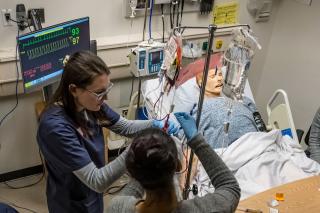The Simmons University direct entry MSN program provides an opportunity for students with a Bachelor's degree in a field other than nursing to pursue a degree as a Family Nurse Practitioner (FNP).
A Registered Nurse (RN) is a vital member of the healthcare team trained to provide comprehensive and compassionate nursing care to patients across the lifespan. So, what is the value of a FNP?
"An advanced practice nurse is an RN with an increased scope of practice," says Tina Delouchry, School of Nursing Professor of Practice and Director of the Direct Entry (DE) Master of Science in Nursing (MSN) FNP Program. "Nurse practitioners (NP) are prepared to work in a variety of settings and are able to diagnose and manage patients, order and interpret diagnostic tests, educate patients and families, and prescribe pharmacologic and non-pharmacologic treatments. They provide a unique approach to care, looking at a patient holistically, not just at their diagnoses, and consider psychosocial factors as well as patient and family preferences and beliefs. Nurse Practitioners increase access to high quality care, especially in underserved areas of the country. They provide preventive care services, patient education, and manage acute and chronic illness to improve the health of patients and communities that they serve."
The Direct Entry program at Simmons is rigorous, allowing students to attain the advanced FNP degree without first needing to gain a bachelor's degree in nursing.
When Delouchry attended nursing school, direct entry programs were limited. "I did a four year bachelor's degree in nursing, worked for a couple years as a registered nurse, and then went on to get a Master's in Nursing — another two years of study — to become a Family Nurse Practitioner."
Students are required to complete prerequisite courses, such as Anatomy and Physiology, Chemistry and Lifespan Development, when they are applying to the DE program. The first 1.5 years of the program are devoted to their pre-licensure coursework to become a registered nurse. Then they begin the post-licensure program, taking coursework to become an advanced practice nurse with a certification as a family nurse practitioner. If enrolled full time, a student can complete the program in three years.
"The pre-licensure component of the program is completed full-time," says Delouchry. "Students complete around 700 clinical hours total in the areas of pediatrics, maternity, psychiatric mental health, community and medical-surgical nursing." Once students complete the pre-licensure, they are required to work a minimum of eight hours per week as a registered nurse while in the post-licensure program, to build upon the skills and knowledge they have gained thus far. During the post-licensure portion of the program, students complete around 670 clinical hours.
In collaboration with the Director of the Simulation Center and Nursing Faculty, Delouchry is also implementing more time in the Simulation lab for students in their pre-licensure program, and will do so for post-licensure students in the future. "The Lab opens many opportunities for students to learn in a safe environment, to gain experience they may not have during a clinical rotation." Students work closely with clinical faculty and various medical mannikins, each with different capabilities. Mannikins can be programmed to present with a variety of symptoms and clinical findings, including abnormal heart and lung sounds, respiratory symptoms, or can verbalize pain, as well as other issues. "The students apply the nursing process through patient scenarios and determine how to best manage and care for the patient," says Delouchry. "Students practice clinical hands-on skills in the simulation lab, as well as assessment techniques, clinical judgment, communication and collaboration."
Simmons also partners with hospitals in the Boston area, who are able to offer high quality clinical experiences for students, in both the pre- and post-licensure program. As Delouchry attests, "the clinical experience we are able to offer students is invaluable."
The Boston location and proximity to the Longwood Medical area, in addition to offering the DE program, makes Simmons unique in its varied options for Nursing students. "Simmons was one of the first universities in the nation to offer a nursing program," notes Delouchry. "Not all nursing programs offer a direct entry option, but the program at Simmons is highly recognized and successful, demonstrated by higher than average board pass rates." The pass rate for DE students who completed the pre-licensure program and took the National Council Licensure Examination (NCLEX) in 2022 was 100%, exceeding the national average.
Delouchry began as an adjunct professor for the online FNP program in 2015. She transitioned to a full time teaching position in 2019, and became Director of the DE program in January, 2023. While she enjoys supporting students, faculty, and staff in her new role, she looks forward to getting back to teaching in the future. "I find teaching most rewarding," she says. She also practices clinically as a FNP once per week in the health clinics at local universities. "It's important that, as a faculty member teaching nursing students, I continue to practice in that area. We educate based on evidence-based practice. Our faculty also practice as nurses, and that adds value to the education students receive at Simmons."
For students considering a degree in nursing, Delouchry offers this advice:
- Connect with someone who is a practicing nurse. Having a mentor in the field and arranging a job-shadowing experience is definitely beneficial.
- Immerse yourself in the healthcare field by volunteering or working at a hospital, skilled nursing facility, or outpatient clinic.
- Observe how the healthcare system functions and how nurses work. Observing first hand can give you a perspective of the role of the nurse in healthcare delivery, and whether it's a career you will enjoy.

